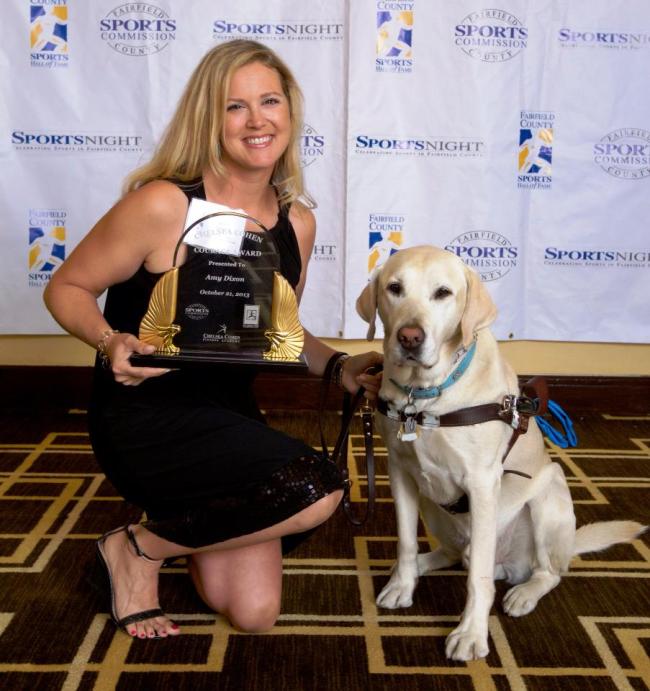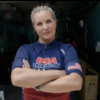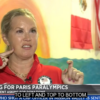I didn’t know there was a ‘trick’ to becoming blind. No one handed me a manual when I lost my sight. No one told me the ‘steps’ I needed to take or the questions I needed to ask. I knew nothing, and literally was ‘flying blind’ through the process. Having been declared ‘legally blind’ by U.S. standards as of December 11th, 2008. I have since become an expert in this area. Certainly not by choice, but most definitely out of necessity.
Being blessed as a hard-headed, ‘never-take-no’ for an answer Sagittarian, and a former Pharm D Student who had to be her own best advocate and cheerleader, has served me well on my path to becoming newly blind. I truly AM a believer in ‘everything happens for a reason’, although at the present moment we may not KNOW what exactly that reason is. While I don’t believe that god intended for our lives to have so much difficulty, heartbreak and hardship, I do believe he gives us the tools to overcome and move away the obstacles in our lives that are preventing forward progress.
My path started with a simple whiney conversation with my friend Scotty, who is an accomplished author and business owner. I was frustrated that I was about to undergo chemotherapy for my autoimmune eye disease and angered by the lack of flow of information from the variety of doctors and experts that were on my team. There were a ‘lot of cooks in the kitchen’ with no head Chef. Scotty volunteered her blind neighbor’s phone number, who was a guide dog user, who himself had recently suffered vision loss due to Retinitis Pigmentosa, a disease with a similar path to mine. He had stopped working due to his new disability, and spent a great deal of time helping the disabled and working with special needs kids. While I was terrified to even make that call, admitting that I too, was in the same shoes as Alan, I knew that the feeling of loneliness and sadness and frustration due to lack of education was harder than dialing the phone to admit that I needed help. I had always known the day would come, but I had always imagined in my head that when my vision loss would happen, that I’d be happily married with two great incomes, a family, and a house of my own. Standing alone in my apartment with my cat was not how I envisioned this happening, nor the support network that I had planned on surrounding myself with.
Alan seemed to be expecting my call. I was awkward and uncharacteristically shy. I was choking back the tears that so desperately wanted to come. I had so many questions I didn’t even know where to begin. I felt my shoulders drop as I began to share my story of vision loss and how I got here. He sighed and listened, sympathizing with each and every disappointing doctors’ visit and procedure. I relaxed a little as i told him how frightened I was about the possibility of losing my job, my friends, and my independence. I finally let myself have a good cry, and he was patient and kind enough to let me do it. Once I pulled myself together, the questions got tougher from Alan.
“Did you call BESB?” he asked.
“Who’s BESB?” I replied.
“Do you have a certificate of legal blindness yet?”
“What is THAT?” I puzzled.
“Have you turned in your driver’s license yet?”
“No.”
“Have you applied for disability?”
“I have no idea. You can do that?”
The questions continued, and I could almost see him shaking his head through the phone. I had NO clue about anything he was talking about. I heard him take a deep breath and say, “Go get a piece of paper and a pen. I want you to write all this down. One- you need to go buy a fax/ scanner/ printer at Staples. Keep your receipt, as it will be tax deductible. Two- make a list of all your doctors and get a copy of your job’s disability benefits policy. Three- CALL BESB- the Board of Education and Services for the Blind. They are the ‘governing body’ for social services for the blind here in Connecticut. It might not hurt to contact the Jewish Guild and Lighthouse for the Blind in New York City as well. Here’s the number. Make an appointment to see the social worker and get an appointment with a mobility instructor to teach you how to use a cane. Have their vocational rehab person come to your office and see what accommodations can be made for you in your office. Four- Get your certificate of legal blindness. You can’t do anything without it. Get all your paperwork from the doctors- visual field exams, test results, etc, and send it overnight to BESB with your driver’s license. That should get the ball rolling. Your fax will be a busy place, and don’t hesitate to call me with any questions.”
I thanked him and slumped down on my kitchen floor. What the heck was I getting into? This was a whole world I had no clue existed until this very moment. I was beyond overwhelmed. I stared at the sheet of paper, the lines, bending and waving as my vision ebbed and flowed, and shut my eyes tightly. I was NOT going to cry again. “Thank you Alan, I’ll keep you posted.” And with that, I hung up. Buoyed by the new information I held in my trembling hands, I wiped my eyes and dialed BESB’s number.
I learned quickly that anything involving the government happens in a sea of red tape so long that it seems to flow in a parallel universe, beyond space and time. I was angry, determined and pissed off- at the world, at the unfairness of it all, at my disease, my body that was failing me, and the doctors and workers at BESB that held my fate in their hands. My fuse was incredibly short, and god have mercy on the poor soul who ended up on the wrong end of an extended hold on the phone. I was a volatile angry hot mess. Apparently the social worker that handles ‘new cases’ was only working on Thursdays, and the holidays in 2008 fell on a Thursday, leaving me without a cane for more than a month. I called daily and looked for alternatives, finally pestering them all the way to the director’s office after a fair amount of threatening.
After working with the cane for several weeks, I grew weary of the pathetic stares, and the quiet whispers of people in public talking about ‘that poor blind girl’ as I bumped and maneuvered my way through the crowded Grand Central Station. I was leery of transitioning to a Guide Dog, but warmed up to the idea once my sister explained that the dog is able to travel with me for business, leaving all my excuses in the dust.
BESB did a lot of great things to prepare me for the world of the blind. One has to go through what is called Orientation and Mobility Training, or O&M training with a cane or eventually a dog if approved by their cane instructor. You must prove to the Guide Dog School and the state that you are SAFE enough alone with your cane in order to handle the addition of the dog. While our guide dogs are incredibly smart, and can remember specific routes and places and alert us to curbs, narrow passages, stairs, and doors, they truly go wherever they are told. If a blind person doesn’t have good orientation skills, they can get very lost or seriously hurt. My first lessons were in using the cane safely on straight lines in familiar places. As I advanced, we tackled intersections, where I would be blindfolded, and learn to listen to traffic patterns for parallel versus perpendicular traffic, waiting to cross when the traffic changed direction. I was taught the number of seconds that certain WALK lights need to cycle through in order to change the traffic light from green to red. I was becoming more in tune with my hearing, and sensitive to vibrations very quickly.
I was taught about adaptive aids for vision, such as magnifiers, special light bulbs, and computer software that would read my emails and internet aloud to me. I was educated on the accessibility of my phone, taught grooming tricks and organization skills in my home to keep colors straight and my cabinets in order. I had cooking lessons and was shown how to handle both gas and electric stoves without sight. I learned special knife and cutting skills. I was introduced to talking timers and tactile numbers that mimicked braille to determine the oven temperature and to feel my prescription labels. None of this had I ever imagined existed.
I was walked through the disability paperwork by an organization called Allsup that handles these cases for the newly disabled. I was under the assumption that I was going to try to work through the months of chemo, and I had assumed terribly wrong. Once I had my guide dog, I learned to ride the public transit with my O&M instructor, showing me how to keep Elvis from sliding down the narrow aisle each time the bus abruptly halted, and how to keep his tail and paws from getting stepped on during our crowded evening commute home. Dressing became an art, and I ditched my cute shoes and handbags for sturdy, heavy-soled shoes and a backpack to avoid the constant tripping on uneven sidewalks and lugging the various layers of clothing, dog food, and medication on needed on me at all times.
Alan continued to mentor me through the entire process, start to present, walking me through each step and guiding me around each and every seemingly impossible obstacle and hurdle. The perks of my new ‘legally blind’ status? I got a bigger tax deduction, a free fishing license (yes, seriously they issue this to you the day you’re declared blind- apparently they think that’s a blind person’s sport), a half price bus pass, half price train pass, upgrades on planes to the bulkhead seat or business class, and one cool dog. Oh, and also an impressive collection of hats and sunglasses. Being visually impaired requires that you protect your eyes at all times, and low hanging branches for those of us on sidewalk travel becomes a frequent issue, therefore requiring the use of a sturdy baseball cap and glasses for protection. Go figure….
So my advice to those persons who are newly sight-impaired or have relatives or friends going through the same challenge is this. Find a blind friend who has ‘been there, done that’ and listen to them. Be proactive and demand timely responses from your emails and faxes. EDUCATE yourself about your disease- take notes and ask LOTS of questions- the doctors work for YOU. Be prepared to be running a medical office out of your home for at least 4 months until you are ‘set up’ with the services you need. Keep MULTIPLE copies of your certificate of legal blindness on hand once you have it. That piece of paper is like gold and will open ALL the doors you need opened once you have it.
Go to yoga. What? Never tried it? Now’s the time. Seriously. You’re going to need a little ‘zen’ in your life where you can simply check out for an hour. Even if you suck at it, are overweight and inflexible. Go. You’re going to need the therapy it provides. And that’s another thing. Get a therapist. If you have a broken foot, you have an orthopedist. When your nerves are shot, and you’re upset and confused, get those nerves fixed. Take medication if you have to. This is a BIG transition in your life. Possibly the biggest adjustment you’ll ever face, so don’t fight it. Fighting it only makes you feel worse. Find a neutral person that can hold your hand and help you stay strong through this whole process. It’s a process. It’s grief. It is a loss. You will go through many stages of dealing with blindness; anger, fear, denial, sadness, and acceptance. Having a professional to guide you through that can make it or break it for you. It doesn’t have to be a solo journey. Include your friends and family on your decisions and treatment options, and be VERBAL about how your needs are changing. No one is going to know what to say to you, or how to help you, or when to leave you alone. Be fair and be clear, and they will be your support network.
Join support groups for your eye disease online. There are entire HUGE communities on Facebook, Yahoo and Foundation Fighting Blindness, local hospitals, and more all around the world. Share your story. I guarantee you there’s at least ten people out there going through the exact same thing you are RIGHT NOW.
And FINALLY, my best ‘advice’ to you or you loved one is to LET GO of what your expectations about being a blind person are. Blindness is NOT a death sentence. It IS the death of a part of you that you relied on for so many years, and grieve it for what it is- a loss. BUT, by letting go of what you THINK is going to happen, you open yourself to the reality that it is NOT nearly as scary as we all see in the movies, and you WILL live a full, maybe even fuller life than you ever did before vision loss. Focus on the HUNDREDS and THOUSANDS of things that you CAN do, and NOT what you can’t. Honestly? for me, life without sight is not worse or harder, it’s just different. Everything I do is slightly different that how I used to do things. Maybe it takes a little longer sometimes, but with practice, I do them just as fast as a fully sighted person. LITERALLY there is NOTHING I cannot do that I did before vision loss because there is an accommodation for EVERYTHING! Skiing, swimming, biking, knitting, writing, cleaning, cooking- EVERYTHING. Driving is still the universal taboo for us unsighted folks, but thanks to the great folks at Google, driverless cars that have safely navigated 300K miles without a single accident are now a reality in Arizona and California. Guess where I’m moving soon? I never imagined that I would be a blind writer, triathlete, skier, spokesperson, sommelier and philanthropist. Before friends like Alan, I had no idea they existed. Now get out there and LIVE!




Amy, I love this! I feel like I met you after you were through all of this, and I feel a little guilty about that. HOWEVER, can this book have a chapter on the positive impact a visually impaired person has on other people’s worlds? SERIOUSLY! Every blog post I read inspires and motivates me more!!!! patty collins
So well put. I really appreciate your writing. You’re doing great, keep it up.
Amy, in all my years in the Lions Club, and all the times we, the Lions, have hosted graduations, back at a time when they were off campus, I have Never had this deep of an understanding as you have given me with this post. God Bless you and thank you for being you and helping so many people that are visually impaired and going thru such tremendously and difficult and testing times… keep it up young lady. YOU are making a difference:)
Amy this is wonderfully written!
That means a TON coming from my great teacher! I think of you EVERY single time I open my laptop. I still look weekly at your ‘rules’ and am so blessed to have your mentorship! I hear your voice every time I put pen to paper and pray each day for your health! MUCH love and THANK YOU!
Thank you for helping my understand what my daughter has been going through. We will draw strength for your positive outlook and example!